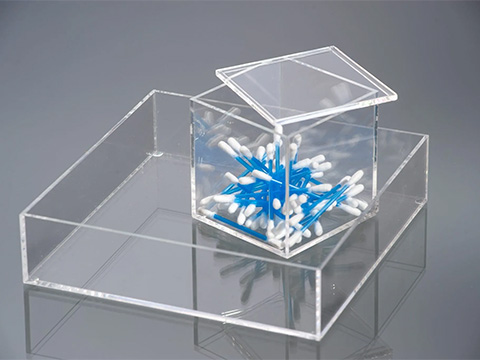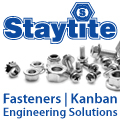
Posted to News on 13th Jun 2025, 11:15
Methylene chloride: its dangers and what to use instead
Permabond reports that none of its vast range of adhesive products contain methylene chloride. As a company, it is constantly looking for ways to reduce hazards and make its customers' workplaces safer. Permabond offers safer alternatives to methylene chloride-based products that are just as effective.

(Pictured: A good example of a product that is likely to have been solvent welded)
Methylene Chloride (also known as Dichloromethane) has long been used in the manufacture of adhesives. Its main purpose is that of a solvent, helping to dissolve many types of plastic and resin polymers found in adhesives such as acrylics, polyurethanes and PVC. This helps with creating a uniform adhesive structure and texture and can increase final bond strength.
Methylene chloride is often found in products used for solvent welding of plastics. This is a process whereby pieces of plastic are joined after they have been clamped together. The solvent-based adhesive can be applied along the gap between the parts, and due to its very low viscosity, quickly wicks (seeps) into the joint and starts to melt the two pieces of plastic together.
Speaking of the dangers of methylene chloride, the US Environmental Protection Agency (EPA) in 2022 concluded that it "presents unreasonable risk to human health", and in 2024 subsequently banned its use in the manufacture of most industrial and consumer products. Methylene chloride is acutely dangerous - with enough exposure it can cause narcosis, brain damage and even heart failure. Longer term, the European Chemicals Agency suspects it of being carcinogenic and possibly endocrine disrupting, with other, more minor effects ranging from skin and respiratory irritation to central nervous system issues like dizziness and headaches.
Alternatives to methylene chloride-based adhesives
For an alternative to solvent welding for pre-assembled plastic parts, consider Permabond UV6302. This adhesive, which cures when exposed to UV light, contains no solvents and has a very low viscosity (75 m.Pas.) This means that it will flow into a clamped joint through capillary action, just as a solvent-based product would. It offers a good shear strength on acrylic, polycarbonate and other plastics, and cures in seconds.
For an even stronger bond, you may also want to consider Permabond UV6260. Similarly to UV6302, this adhesive cures when exposed to UV light, remaining liquid beforehand. This allows for accurate alignment of parts before bonding, even once the adhesive has been applied. UV6260 cures fully even when the UV light is filtered by a coloured or darkened substrate, which makes it perfect for the bonding of tinted or dark glass. It achieves highly resilient bonds on many plastics, with the plastics failing before the adhesive during product testing.
More alternatives to consider
Permabond offers a wide range of innovative products that can help you not only avoid methylene chloride, but also solve many common bonding challenges. One such innovation is Permabond 130UV. This is both a cyanoacrylate and a UV-curing adhesive, meaning that it cures both when exposed to UV light, along with the moisture present in the air and on most surfaces. This combination offers many advantages, the most important of which being able to cure in so-called 'shadow areas' not reached by UV light.
If you're looking to bond nylon, a notoriously challenging substrate, look no further than Permabond TA4550. This structural acrylic forms strong bonds on most types of nylon, including PA6, 6.6 and 12. It also bonds well to composites, metals and other plastics, and has a low odour for worker comfort. It has a thixotropic viscosity and a fast cure, with a fixture time of just 5-6 minutes.
Other products may also be of interest for replacing methylene chloride-based adhesives. Permabond 712 is a breakthrough cyanoacrylate with outstanding water and humidity resistance. Structural acrylics such as TA4204 help in situations where UV curing may not be possible.
Permabond Engineering Adhesives Ltd
Unit 5, Wessex Business Park
Colden Common
SO21 1WP
UNITED KINGDOM
+44 (0) 1962 711661





